Anpassungsfähigkeit und Resilienz des Finanzsystems
Diese Forschungsgruppe untersucht kritische Aspekte der Anpassungsfähigkeit und Widerstandsfähigkeit von Finanzsystemen. Sie analysiert die Auswirkungen von Naturkatastrophen auf Finanzsysteme, die Auswirkungen politischer Präferenzen für die grüne Transformation und die Bedeutung von Kultur in den Volkswirtschaften.
Forschungscluster
Finanzresilienz und RegulierungIhr Kontakt

- Abteilung Finanzmärkte
PROJEKTE
08.2022 ‐ 07.2025
OVERHANG: Schuldenüberhang und grüne Investitionen – die Rolle von Banken für den klimafreundlichen Umgang mit emissionsintensiven Anlagenvermögen
Bundesministerium für Bildung und Forschung (BMBF)
Ziel von OVERHANG ist es, die Rolle von Banken für den klimafreundlichen Umgang mit emissionsintensiven Anlagevermögen zu untersuchen. Hierdurch sollen politikrelevante Erkenntnisse zu Finanzregulierung, staatlich kontrollierter Kreditvergabe und Finanzstabilität identifiziert sowie eine Sensibilisierung der verschuldeten Akteurinnen und Akteuren erreicht werden.
Das Projekt wird vom Bundesministerium für Bildung und Forschung (BMBF) finanziert.
01.2015 ‐ 12.2019
Interactions between Bank-specific Risk and Macroeconomic Performance
Deutsche Forschungsgemeinschaft (DFG)
07.2016 ‐ 12.2018
Relationship Lenders and Unorthodox Monetary Policy: Investment, Employment, and Resource Reallocation Effects
Leibniz-Gemeinschaft
We combine a number of unique and proprietary data sources to measure the impact of relationship lenders and unconventional monetary policy during and after the European sovereign debt crisis on the real economy. Establishing systematic links between different research data centers (Forschungsdatenzentren, FDZ) and central banks with detailed micro-level information on both financial and real activity is the stand-alone proposition of our proposal. The main objective is to permit the identification of causal effects, or their absence, regarding which policies were conducive to mitigate financial shocks and stimulate real economic activities, such as employment, investment, or the closure of plants.
Referierte Publikationen
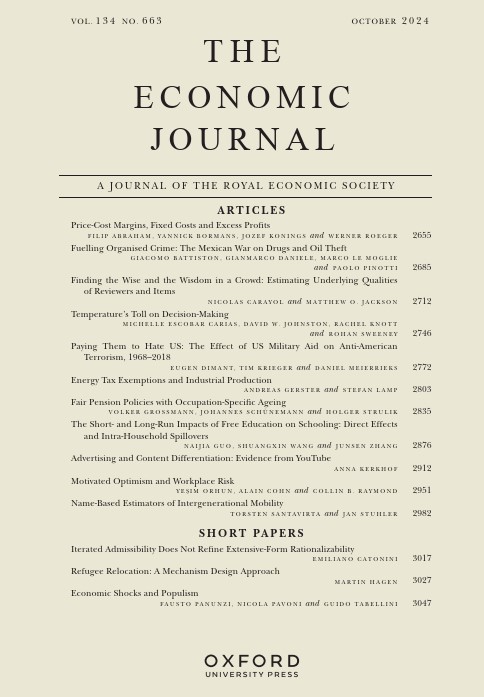
The Political Economy of Financial Systems: Evidence from Suffrage Reforms in the Last Two Centuries
in: Economic Journal, Nr. 611, 2018
Abstract
Voting rights were initially limited to wealthy elites providing political support for stock markets. The franchise expansion induces the median voter to provide political support for banking development, as this new electorate has lower financial holdings and benefits less from the riskiness and financial returns from stock markets. Our panel data evidence covering the years 1830–1999 shows that tighter restrictions on the voting franchise induce greater stock market development, whereas a broader voting franchise is more conducive to the banking sector, consistent with Perotti and von Thadden (2006). The results are robust to controlling for other institutional arrangements and endogeneity.

What Type of Finance Matters for Growth? Bayesian Model Averaging Evidence
in: World Bank Economic Review, Nr. 2, 2018
Abstract
We examine the effect of finance on long-term economic growth using Bayesian model averaging to address model uncertainty in cross-country growth regressions. The literature largely focuses on financial indicators that assess the financial depth of banks and stock markets. We examine these indicators jointly with newly developed indicators that assess the stability and efficiency of financial markets. Once we subject the finance-growth regressions to model uncertainty, our results suggest that commonly used indicators of financial development are not robustly related to long-term growth. However, the findings from our global sample indicate that one newly developed indicator—the efficiency of financial intermediaries—is robustly related to long-term growth.

Corporate Social Responsibility and Firm Financial Performance: The Mediating Role of Productivity
in: Journal of Business Ethics, Nr. 3, 2018
Abstract
This study treats firm productivity as an accumulation of productive intangibles and posits that stakeholder engagement associated with better corporate social performance helps develop such intangibles. We hypothesize that because shareholders factor improved productive efficiency into stock price, productivity mediates the relationship between corporate social and financial performance. Furthermore, we argue that key stakeholders’ social considerations are more valuable for firms with higher levels of discretionary cash and income stream uncertainty. Therefore, we hypothesize that those two contingencies moderate the mediated process of corporate social performance with financial performance. Our analysis, based on a comprehensive longitudinal dataset of the U.S. manufacturing firms from 1992 to 2009, lends strong support for these hypotheses. In short, this paper uncovers a productivity-based, context-dependent mechanism underlying the relationship between corporate social performance and financial performance.
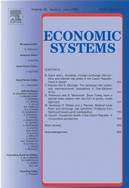
Should Banks Diversify or Focus? Know Thyself: The Role of Abilities
in: Economic Systems, Nr. 1, 2018
Abstract
The paper investigates whether diversification/focus across assets, industries and borrowers affects bank performance when banks’ abilities (screening and monitoring) are considered. The initial results show that diversification (focus) at the asset, industry and borrower levels is expected to decrease (increase) returns. However, once banks’ screening and monitoring abilities are controlled for, the effect of diversification/focus either gets weaker or disappears. Further, in some cases, these abilities enhance banks’ long-run performance, but in others they prove to be costly, at least, in the short run. Thus, the level of monitoring and screening abilities should be taken into consideration in understanding, planning and implementing diversification/focus strategies.

Regional Banking Instability and FOMC Voting
in: Journal of Banking and Finance, 2018
Abstract
This study analyzes if regionally affiliated Federal Open Market Committee (FOMC) members take their districts’ regional banking sector instability into account when they vote. Considering the period 1979–2010, we find that a deterioration in a district's bank health increases the probability that this district's representative in the FOMC votes to ease interest rates. According to member-specific characteristics, the effect of regional banking sector instability on FOMC voting behavior is most pronounced for Bank presidents (as opposed to Governors) and FOMC members who have career backgrounds in the financial industry or who represent a district with a large banking sector.
Arbeitspapiere

Capital Requirements, Market Structure, and Heterogeneous Banks
in: IWH Discussion Papers, Nr. 15, 2022
Abstract
Bank regulators interfere with the efficient allocation of resources for the sake of financial stability. Based on this trade-off, I compare how different capital requirements affect default probabilities and the allocation of market shares across heterogeneous banks. In the model, banks‘ productivity determines their optimal strategy in oligopolistic markets. Higher productivity gives banks higher profit margins that lower their default risk. Hence, capital requirements indirectly aiming at high-productivity banks are less effective. They also bear a distortionary cost: Because incumbents increase interest rates, new entrants with low productivity are attracted and thus average productivity in the banking market decreases.

Covered Bonds and Bank Portfolio Rebalancing
in: Norges Bank Working Papers, Nr. 6, 2021
Abstract
We use administrative and supervisory data at the bank and loan level to investigate the impact of the introduction of covered bonds on the composition of bank balance sheets and bank risk. Covered bonds, despite being collateralized by mortgages, lead to a shift in bank lending from mortgages to corporate loans. Young and low-rated firms in particular receive more credit, suggesting that overall credit risk increases. At the same time, we find that total balance sheet liquidity increases. We identify the channel in a theoretical model and provide empirical evidence: Banks with low initial liquidity and banks with sufficiently high risk-adjusted return on firm lending drive the results.
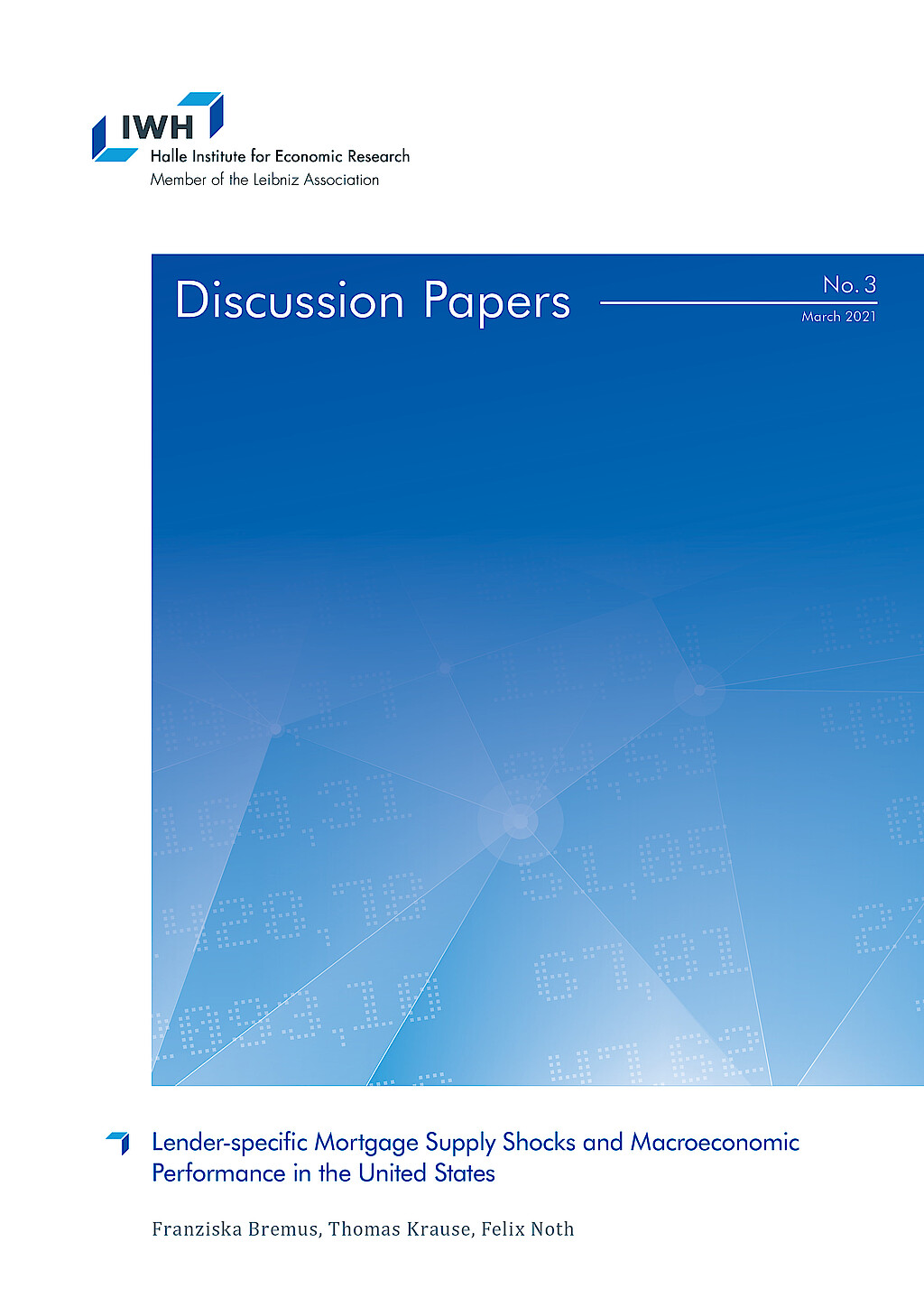
Lender-specific Mortgage Supply Shocks and Macroeconomic Performance in the United States
in: IWH Discussion Papers, Nr. 3, 2021
Abstract
This paper provides evidence for the propagation of idiosyncratic mortgage supply shocks to the macroeconomy. Based on micro-level data from the Home Mortgage Disclosure Act for the 1990-2016 period, our results suggest that lender-specific mortgage supply shocks affect aggregate mortgage, house price, and employment dynamics at the regional level. The larger the idiosyncratic shocks to newly issued mortgages, the stronger are mortgage, house price, and employment growth. While shocks at the level of shadow banks significantly affect mortgage and house price dynamics, too, they do not matter much for employment.
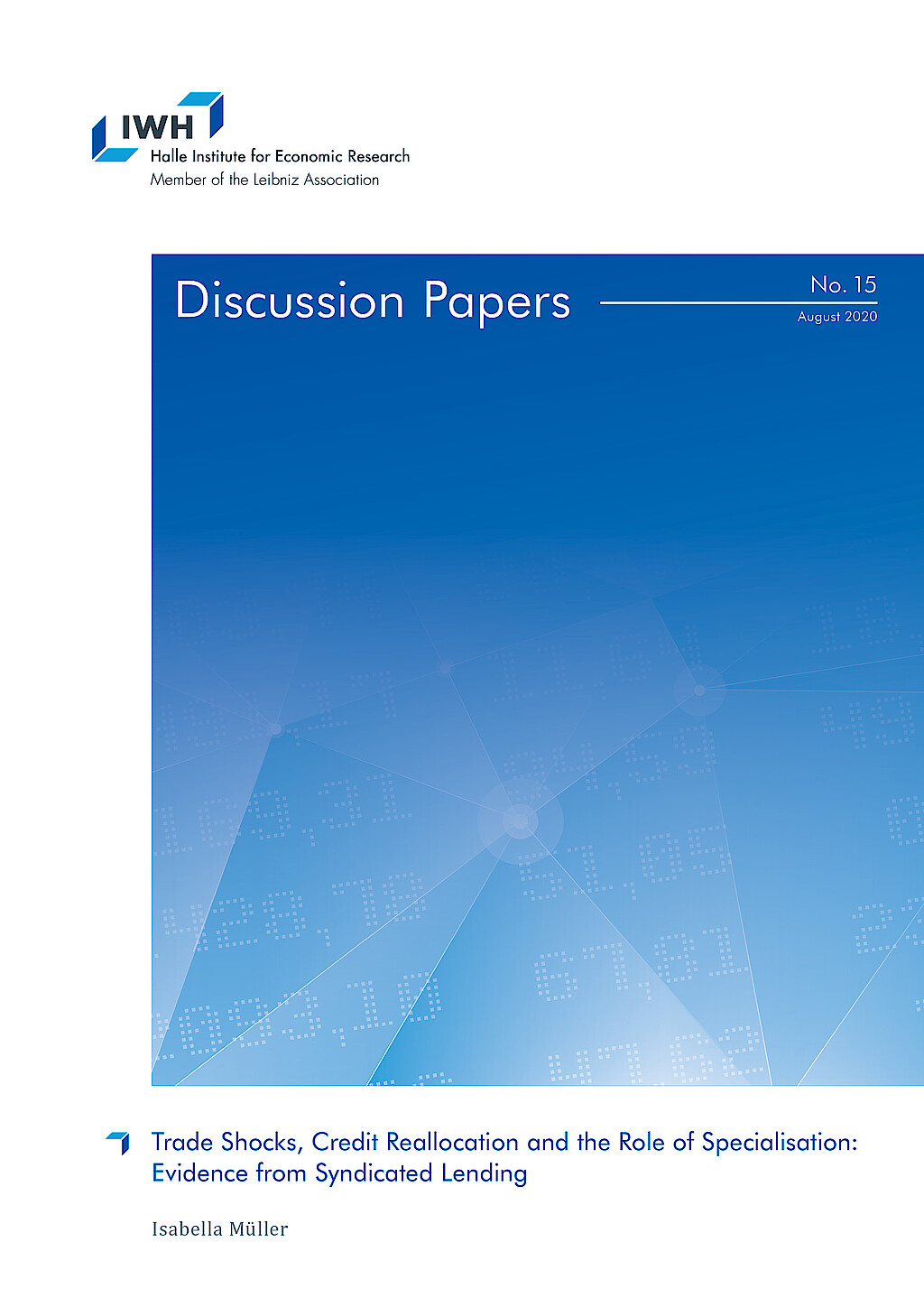
Trade Shocks, Credit Reallocation and the Role of Specialisation: Evidence from Syndicated Lending
in: IWH Discussion Papers, Nr. 15, 2020
Abstract
This paper provides evidence that banks cut lending to US borrowers as a consequence of a trade shock. This adverse reaction is stronger for banks with higher ex-ante lending to US industries hit by the trade shock. Importantly, I document large heterogeneity in banks‘ reaction depending on their sectoral specialisation. Banks shield industries in which they are specialised in and at the same time reduce the availability of credit to industries they are not specialised in. The latter is driven by low-capital banks and lending to firms that are themselves hit by the trade shock. Banks‘ adjustments have adverse real effects.
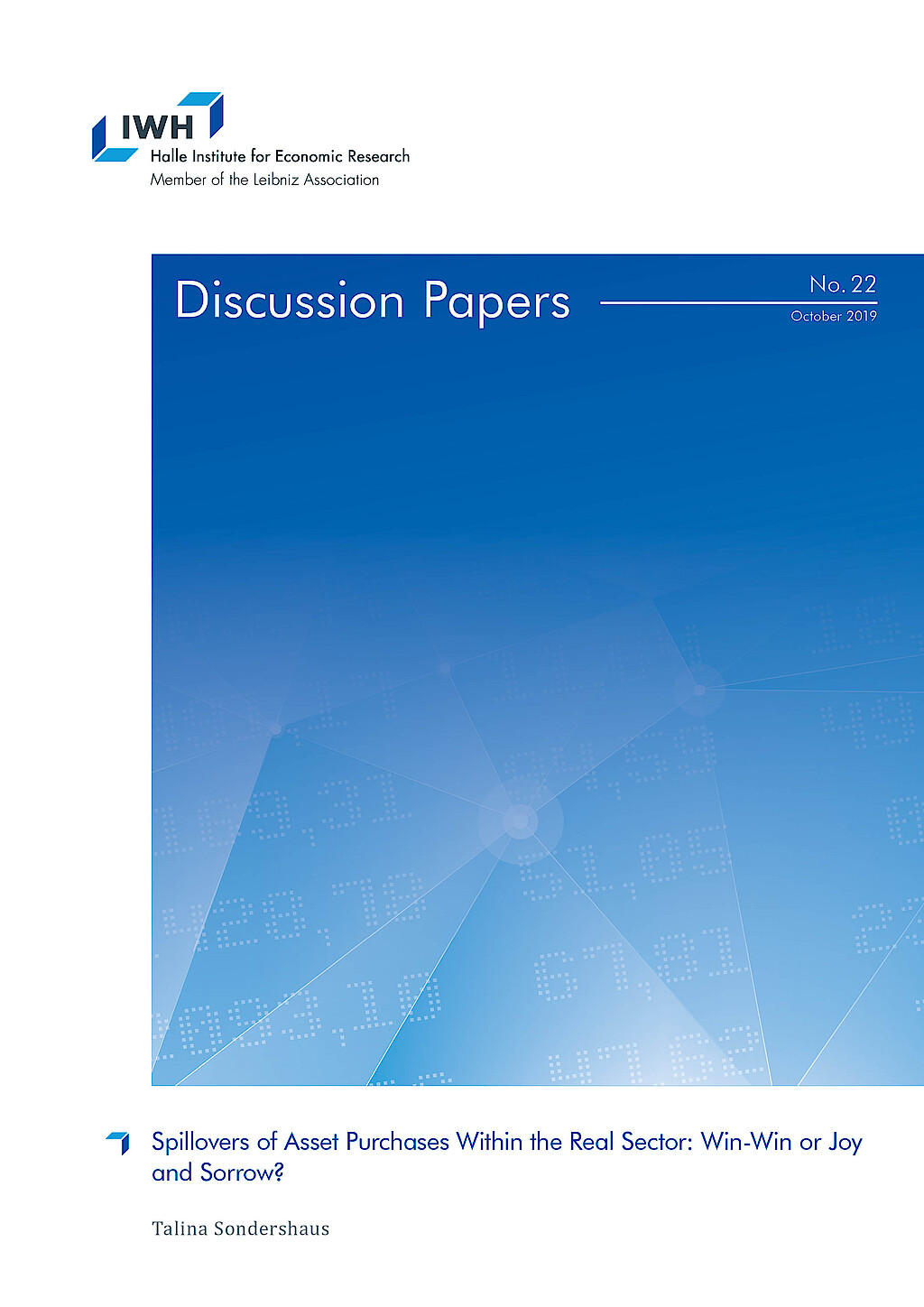
Spillovers of Asset Purchases Within the Real Sector: Win-Win or Joy and Sorrow?
in: IWH Discussion Papers, Nr. 22, 2019
Abstract
Events which have an adverse or positive effect on some firms can disseminate through the economy to firms which are not directly affected. By exploiting the first large sovereign bond purchase programme of the ECB, this paper investigates whether more lending to some firms spill over to firms in the surroundings of direct beneficiaries. Firms operating in the same industry and region invest less and reduce employment. The paper shows the importance to consider spillover effects when assessing unconventional monetary policies: Differences between treatment and control groups can be entirely attributed to negative effects on the control group.



















